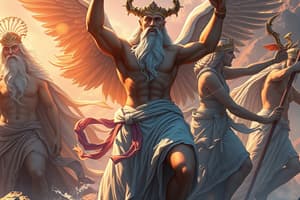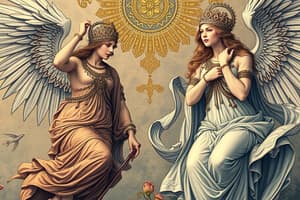Podcast
Questions and Answers
¿Cuál es el propósito principal de las historias de la mitología griega según el texto?
¿Cuál es el propósito principal de las historias de la mitología griega según el texto?
- Entretener a la audiencia.
- Enriquecer rituales religiosos.
- Explicar fenómenos naturales.
- Reforzar normas sociales. (correct)
¿Qué elemento desempeñó un papel crucial en dar forma al universo narrativo de la mitología griega?
¿Qué elemento desempeñó un papel crucial en dar forma al universo narrativo de la mitología griega?
- Dioses y diosas de Olimpo. (correct)
- Tribus Pelasgas.
- Espíritus ancestrales y de la tierra.
- Héroes y monstruos.
¿Qué término se refiere a la mezcla de diferentes creencias religiosas que contribuyeron a dar forma a la mitología griega?
¿Qué término se refiere a la mezcla de diferentes creencias religiosas que contribuyeron a dar forma a la mitología griega?
- Sincronismo. (correct)
- Politeísmo.
- Ateísmo.
- Monoteísmo.
¿Qué grupos culturales influyeron en el desarrollo de la mitología griega a medida que se expandía el comercio y la colonización?
¿Qué grupos culturales influyeron en el desarrollo de la mitología griega a medida que se expandía el comercio y la colonización?
¿Cuál fue el papel de las tribus Pelasgas en los primeros tiempos de la mitología griega?
¿Cuál fue el papel de las tribus Pelasgas en los primeros tiempos de la mitología griega?
¿Quién era el rey de los dioses en la mitología griega, simbolizando la ley y el orden, la justicia y la moralidad?
¿Quién era el rey de los dioses en la mitología griega, simbolizando la ley y el orden, la justicia y la moralidad?
¿Quién era la diosa del hogar, matrimonio, parto, mujeres y familia en la mitología griega, a veces mostrándose vengativa cuando era desrespetada?
¿Quién era la diosa del hogar, matrimonio, parto, mujeres y familia en la mitología griega, a veces mostrándose vengativa cuando era desrespetada?
¿Cuál de los siguientes dioses era conocido como el dios del mar, los caballos, los terremotos y hermano de Zeus y Hades?
¿Cuál de los siguientes dioses era conocido como el dios del mar, los caballos, los terremotos y hermano de Zeus y Hades?
¿Quién era la diosa de la caza, la naturaleza salvaje, los animales salvajes, la virginidad y el parto en la mitología griega?
¿Quién era la diosa de la caza, la naturaleza salvaje, los animales salvajes, la virginidad y el parto en la mitología griega?
¿Quién era conocido como el dios del sol, patrón de la música, las artes, la poesía, la profecía, la sanación, la prevención de plagas y el control de enfermedades en la mitología griega?
¿Quién era conocido como el dios del sol, patrón de la música, las artes, la poesía, la profecía, la sanación, la prevención de plagas y el control de enfermedades en la mitología griega?
Flashcards are hidden until you start studying
Study Notes
Introduction
Greek mythology is a fascinating tapestry of stories and characters that have captivated generations with their heroic feats, moral dilemmas, and profound insights into human nature. These tales were told by ancient Greeks to explain natural phenomena, enrich rituals, and reinforce social norms. From the gods and goddesses who ruled Olympus to the heroes and monsters they interacted with, each element played a crucial role in shaping this vibrant narrative universe. While some elements may seem fantastical today, they held deep significance within the context of early civilization.
In the pages ahead, we will delve into various aspects of Greek mythology, including its origins, prominent figures, themes, and enduring legacy. Our aim is to illuminate these age-old narratives through comprehensive analysis while preserving their essence as accessible and engaging stories. So, let's embark on this journey together!
Origin and Development of Greek Mythology
The roots of Greek mythology can be traced back to prehistoric times. Early tribes, known as Pelasgians, inhabited Greece before being displaced by the Indo-European speaking Greeks around the second millennium BCE. Over time, local cults emerged, centering around deified ancestors and land spirits. As trade and colonization spread across the Mediterranean, so did cultural exchange, leading to syncretism—the blending of different religious beliefs—which further shaped Greek mythology.
By the Archaic Period (ca. 700–500 BC), poetry became a central form of introducing new myths and adapting old ones. Homer's epic poems, such as the Iliad and Odyssey, introduced many now famous gods and heroes like Aphrodite, Zeus, Athena, Achilles, and Odysseus. Another powerful influence was the chorus in plays from the Classical Period (500–323 BC), which helped shape myths into structured narratives. Later, Roman poets continued to adapt and popularize Greek myths among wider audiences.
Despite the advent of Christianity, Greek mythology remained deeply ingrained in Western culture. Its influence could still be seen in medieval art, Renaissance literature, and even modern works like George Lucas’ Star Wars saga, drawing parallels between Luke Skywalker and Hercules or the Force and divine intervention.
Prominent Figures in Greek Mythology
At the heart of Greek mythology lie its pantheon of gods and demigods, each with distinct personalities, powers, and roles. Some of the most significant figures include:
- Zeus: King of the Gods, ruler of sky and thunderbolts. He symbolized law and order, justice, and morality.
- His wife Hera: queen of heaven and earth; goddess of marriage, childbirth, women, family, and domestic life. She could also be vengeful when disrespected.
- Poseidon: god of sea, horses, earthquakes, and brother of Zeus and Hades. He is responsible for creating horse domestication, and his anger led to devastating floods.
- Demeter: goddess of agriculture, harvest, growth, nourishment, and fertility. She presides over planting and reaping seasons.
- Artemis: daughter of Atlas and Theia, twin sister of Apollo. Titian goddess of hunting, wilderness, wild animals, virginity, and the childbirth.
- Apollo: son of Atlas and Theia. Known as the Sun God, patron of music, arts, poetry, prophecy, healing, plague prevention, and disease control.
- Daphne: daughter of River River and Earth, transformed into laurel tree to escape Apollo's advances. Laurel wreath worn by Olympic winners honors her sacrifice.
These deities embodied abstract ideas and principles that guided humans towards wisdom, courage, and piety. Their intertwining narratives created complex relationships full of love, jealousy, betrayal, revenge, and redemption.
Themes in Greek Mythology
Greek mythology revolved around several recurring themes that resonate beyond antiquity:
- Power struggles: Conflicts often arise due to power dynamics, either within families like the House of Plantagenet or among siblings or cousins competing for throne like Caesar, Brutus & Cassius.
- Inheritance: Many myths involve rivalries over inheritances and succession rights. For example, the Trojan War stemmed from Paris winning Helen—in theory, Zeus' property—and giving her away to the mortals.
- Divine Intervention: Deified beings like Hermes, Athena, and other lesser gods and goddesses intervene to protect their loved ones or fulfill promises made earlier.
- Heroism vs. Villainy: Good versus evil conflicts showcase valor against tyranny where strong-willed individuals fight against oppressive regimes like Mordor's rule under Sauron.
These themes served both as cautionary tales and aspirational narratives, underscoring values like honor, integrity, bravery, and fairness. They reflected society's concerns regarding power abuse, inheritance disputes, and individual choices amidst higher forces' involvement.
Legacy of Greek Mythology
Throughout history, Greek mythology has been a perennial source of inspiration. Its impact transcends mere storytelling, touching upon philosophy, religion, politics, sports, architecture, food traditions, clothing styles, art forms—even our everyday language carries echoes of Greek stories. Here are few examples:
- Philosophers like Plato used mythological motifs in their teachings because they believed there was truth inherent within them.
- Christian authors adapted Greek myths into allegories to convey spiritual lessons without offending readers unfamiliar with church doctrine.
- During the Renaissance period, artists looked back at classical sculptural techniques known since ancient Greece, which greatly influenced Western art.
- Modern films draw connections between mythical creatures such as minotaurs, satyrs, griffins etc., highlighting the imaginative depth drawn from these stories.
- For instance, Harry Potter series draws heavily from Graeco-Roman mythos. Scorpions guarding entrances, Pegasi pulling chariots, Phoenix rising from its own funeral pyre all feature prominently.
- Even architecturally, structures inspired by Greek temples dot landscapes worldwide.
In conclusion, Greek mythology remains relevant due to its timeless exploration of universal concepts like good versus
Studying That Suits You
Use AI to generate personalized quizzes and flashcards to suit your learning preferences.




